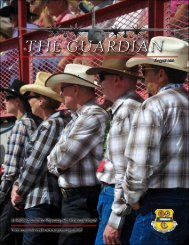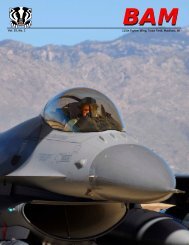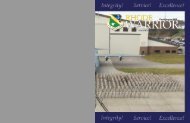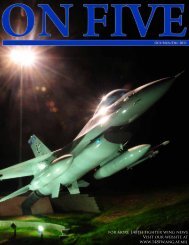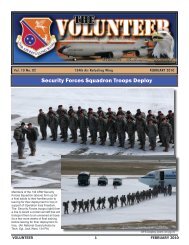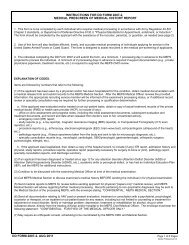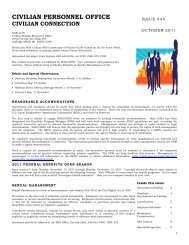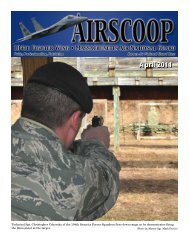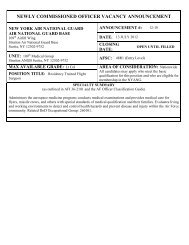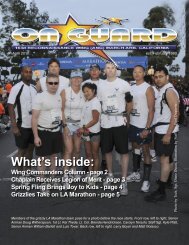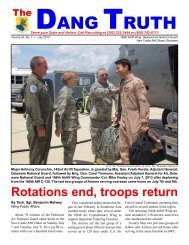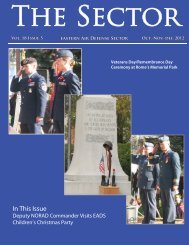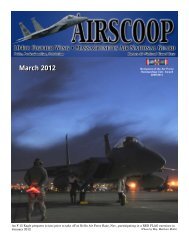January - 102nd Intelligence Wing, Massachusetts Air National Guard
January - 102nd Intelligence Wing, Massachusetts Air National Guard
January - 102nd Intelligence Wing, Massachusetts Air National Guard
You also want an ePaper? Increase the reach of your titles
YUMPU automatically turns print PDFs into web optimized ePapers that Google loves.
Seagull<br />
<strong>102nd</strong> INTELLIGENCE WING<br />
JANUARY<br />
WWW.102IW.ANG.AF.MIL<br />
2011<br />
VOLUME 26 NO. 1<br />
F-100 Super Sabre heads south<br />
| pg. 5
Seagull<br />
JANUARY<br />
This funded <strong>Air</strong> Force newspaper is an authorized publication for members of the U.S. military<br />
services. Contents of the Seagull are not necessarily the official views of, or endorsed by,<br />
the U.S. Government, the Department of Defense or the Department of the <strong>Air</strong> Force. The<br />
editorial content is edited, prepared, and provided by the Public Affairs Office of the <strong>102nd</strong><br />
<strong>Intelligence</strong> <strong>Wing</strong>, <strong>Massachusetts</strong> <strong>Air</strong> <strong>National</strong> <strong>Guard</strong>, 156 Reilly St., Box 60, Otis ANG Base,<br />
MA 02542-1330. All photos are U.S. <strong>Air</strong> Force photographs unless otherwise indicated.<br />
SEAGULL IDEAS?<br />
UPCOMING UTAs >><br />
<strong>102nd</strong> IW PUBLIC AFFAIRS<br />
156 Reilly Street, Box 60<br />
Otis ANG Base, MA<br />
02542-1330<br />
(508) 968-4003<br />
DSN: 557-4003<br />
VOLUME 26 | NUMBER 1<br />
<strong>102nd</strong> IW COMMANDER<br />
Col. Anthony E. Schiavi<br />
PUBLIC AFFAIRS OFFICER<br />
Capt. Evan C. Lagassé<br />
PUBLIC AFFAIRS STAFF<br />
Master Sgt. Sandra Niedzwiecki<br />
Master Sgt. Aaron Smith<br />
Staff Sgt. Kerri Cole<br />
<strong>Air</strong>man 1st Class Luiz Vicentini<br />
Do you have an idea for a Seagull article? Would you like to be the<br />
subject of a story? Exercises, deployments and other operational<br />
information is always welcome. Let us know what is going on in your<br />
organization. (Please limit articles to 500 words.)<br />
The next Seagull deadline is Saturday, Jan. 8, 2011.<br />
JANUARY 2011<br />
2 3 4 5 6 7 8<br />
9 10 11 12 13 14 15<br />
16 17 18 19 20 21 22<br />
23<br />
30<br />
24<br />
31<br />
1<br />
25 26 27 28 29<br />
| IN THIS ISSUE >><br />
COMMANDER’S COMMENTS<br />
pg. 3<br />
MEDICAL SERVICES IN PARAGUAY<br />
pg. 4<br />
KEEPING SAFETY IN THE FOREFRONT<br />
pg. 6<br />
complaints resolution program<br />
pg. 8<br />
ANNOUNCEMENTS<br />
pg. 10<br />
CHAPEL CALL<br />
pg. 11<br />
ON THE COVER >><br />
Unit Training Assembly duty hours are 7 a.m. to 3:30 p.m.<br />
FEBRUARY 2011<br />
6<br />
12<br />
13 14 15 16 17 18 19<br />
20 21 22 23 24 25 26<br />
27<br />
7 8 9 10 11<br />
28<br />
1 2 3<br />
4 5<br />
MARCH 2011<br />
4 5<br />
6 7 8 9 10 11 12<br />
13 14 15 16 17 18 19<br />
20 21 22 23 24 25 26<br />
27<br />
1 2 3<br />
29 28 30 31<br />
APRIL 2011<br />
An F-100 Super Sabre<br />
static display was<br />
removed from its Otis<br />
ANG Base pedestal,<br />
Nov. 30, so it could<br />
be transferred to the<br />
Museum of Aviation at<br />
Robins AFB, Ga.<br />
U.S. <strong>Air</strong> Force photo<br />
by Master Sgt. Sandra<br />
Niedzwiecki<br />
3 4 5 6 7 8 9<br />
10 11 12 13 14 15 16<br />
17 18 19 20 21 22 23<br />
24 25 26 27<br />
1<br />
2<br />
28 29 30<br />
COMMANDER’S COMMENTS SEAGULL | PAGE 3<br />
FROM THE DESK OF THE<br />
<strong>102nd</strong> <strong>Intelligence</strong> <strong>Wing</strong><br />
VICE COMMANDER<br />
By Col. Christina Stevens<br />
DEPARTMENT OF THE AIR FORCE<br />
102D INTELLIGENCE WING (ACC)<br />
MASSACHUSETTS AIR NATIONAL GUARD<br />
OTIS AIR NATIONAL GUARD BASE MASSACHUSETTS<br />
Welcome back and Happy New Year. I hope everyone<br />
had a wonderful holiday and enjoyed some quality<br />
family time and rest and relaxation.<br />
As we turn the calendar over to a new year, it’s a good time<br />
to look forward and consider what challenges lay ahead<br />
so we can prepare and pace ourselves to meet them. It’s<br />
shaping up to be a busy year.<br />
Certainly the upcoming Unit Compliance Inspection (UCI)<br />
is looming large on the not too distant horizon. We haven’t<br />
had a higher headquarters inspection here since 2006 –<br />
with lots of changes happening in those years – so for<br />
many of us there is a tremendous amount of new tricks<br />
to learn. For many unit members, this will be their first<br />
inspection with the <strong>102nd</strong>. With our regular operations<br />
tempo, military construction (MILCON) programs, and a<br />
full training program it can be hard to see how we can fit<br />
in the additional work load of preparing for an inspection.<br />
I have a few thoughts on that.<br />
First, I firmly believe that we do things correctly here at the<br />
<strong>102nd</strong>. Former President George Bush was fond of saying,<br />
“The truth is confirmed by inspection.” So preparing will<br />
really just mean organizing your work place so you can<br />
demonstrate that fact clearly to the UCI inspectors.<br />
Secondly, communicate. Reach out to your Group UCI<br />
team representatives here at Otis, your counterparts in the<br />
field, your contacts at the <strong>National</strong> <strong>Guard</strong> Bureau (NGB),<br />
and your inspectors. If you are unclear about what you will<br />
be tested on, ask around until you have clarified exactly<br />
what items apply to your section.<br />
Finally, don’t procrastinate. I realized recently that it is<br />
almost time for our deployed security forces <strong>Air</strong>men to<br />
return home from Iraq. I couldn’t believe six months had<br />
passed. We can get so focused on executing our day-today<br />
responsibilities that we put off addressing things that<br />
are not on the daily critical path. Being the first month of<br />
the year, with the middle of winter on us, October can feel<br />
like a long way away. It will be here in just seven short<br />
drills. Don’t put off your inspection preparations until the<br />
last months. If you start now, you can hit a reasonable<br />
pace to get you where you need to be next fall.<br />
With three different Major Commands (MAJCOMS) operating<br />
here at Otis, it can be confusing to envision how our<br />
inspection will be executed. <strong>Air</strong> Combat Command (ACC)<br />
will have the lead and I’ve spent a fair amount of time<br />
talking with them about how the three will interact. Right<br />
now, the units and the Inspector General (IG) team are<br />
climbing the learning curve together and there are not<br />
answers for all of the questions. We have the advantage of<br />
watching some of our sister <strong>Intelligence</strong> <strong>Wing</strong>s go through<br />
the same inspection this spring. I’m sure this will go a<br />
long way in defining how the inspection will be handled<br />
and will provide us the answers we seek.<br />
For now, if you have questions or are confused as to where<br />
to start, see your Group UCI representative. We have a<br />
great UCI team pulling together the effort and I’m sure<br />
these individuals will be able to help you. From the <strong>102nd</strong><br />
<strong>Intelligence</strong> Group – Lt. Col. Virginia Doonan; <strong>102nd</strong> <strong>Air</strong><br />
Operations Group – Lt. Col. Gary Cundiff and Capt. Keven<br />
Dunn; <strong>102nd</strong> Mission Support Group – Senior Master Sgt.<br />
Ed Winchester; <strong>102nd</strong> <strong>Wing</strong> Group – Lt. Col. Paige Inscoe<br />
and Maj. Nicole Ivers; and from the <strong>102nd</strong> Medical Group<br />
Maj. Michael McGourty.<br />
24<br />
31
SEAGULL | JANUARY 2011<br />
<strong>Air</strong> <strong>Guard</strong> Physician Assistant serves in Paraguay<br />
By Capt. Evan C. Lagasse<br />
<strong>102nd</strong> <strong>Intelligence</strong> <strong>Wing</strong> Public Affairs<br />
| PAGE 4<br />
SEAGULL | PAGE 5<br />
M a j o r<br />
M i c h a e l<br />
McGourty,<br />
<strong>102nd</strong> Medical<br />
Group<br />
p h y s i c i a n<br />
assistant,<br />
treated 100<br />
Paraguayan<br />
patients in<br />
two days,<br />
Nov. 13-<br />
14.<br />
<strong>Massachusetts</strong> <strong>Air</strong> <strong>Guard</strong> officer spent 28 hours airborne<br />
A round-trip in civilian aircraft in order to provide medical<br />
services for patients 10- to 80-years-old during a fall<br />
weekend in South America.<br />
Major Michael McGourty, <strong>102nd</strong> Medical Group physician<br />
assistant, participated in a Medical Civil Affairs Program<br />
(MEDCAP) with soldiers from the <strong>Massachusetts</strong> Army <strong>Guard</strong>,<br />
Nov.10-17, in the rural San Pablo District of Paraguay.<br />
The travel originated in Boston and temporarily stopped in<br />
both Miami and Brazil before arriving in Paraguay. Then<br />
the real work began.<br />
“The program is set up as two-day patient care and it’s on<br />
a Saturday and Sunday (Nov. 13-14). They tend to use a<br />
local school and the weekend is the best time to do that<br />
so the school’s curriculum is not interrupted,” said Major<br />
McGourty, an eight-year <strong>Air</strong> <strong>Guard</strong> veteran.<br />
Patients waited outside the school in 80-90 degree temperatures<br />
until it was their turn to be seen. Once inside<br />
the school, they met with a provider who was typically one<br />
of four providers in the same classroom all seeing patients<br />
at the same time. Available medical services ranged from<br />
optometry to dental and blood pressure checks to prescription<br />
refills.<br />
which was eased by the availability of several translators,<br />
and the inability for providers to follow up with patients who<br />
had potentially serious conditions.<br />
“One patient had a lump on her thyroid. Was it cancerous?<br />
I don’t know, but I would like to be able to follow up. I contacted<br />
the main Paraguayan authorities about the patient so<br />
they could follow up immediately,” said Major McGourty.<br />
With many moving parts and the short time frame with<br />
which the team had to operate, there was potential for<br />
the MEDCAP to go awry but proper planning, professional<br />
people and patient patients made the event a resounding<br />
success.<br />
“I didn’t really know what to expect when I volunteered for<br />
this trip but I was very impressed by the way the operation<br />
was run. The team did an amazing job with logistics and<br />
it was clear how much the Paraguayan military genuinely<br />
cares about their people,” said Major McGourty.<br />
In addition to Major McGourty and the <strong>Massachusetts</strong> Army<br />
<strong>Guard</strong> soldiers on the MEDCAP, the team consisted of U.S.<br />
active duty servicemembers, Paraguayan medical personnel<br />
and Paraguayan special forces.<br />
<strong>Massachusetts</strong> is partnered with the country of Paraguay<br />
through the <strong>National</strong> <strong>Guard</strong>’s multifaceted State Partnership<br />
Program (SPP) which links U.S. states with foreign nations<br />
to promote and enhance bilateral relations.<br />
F-100 super sabre heads south<br />
Photos By Master Sgt. Sandra Niedzwiecki<br />
<strong>102nd</strong> <strong>Intelligence</strong> <strong>Wing</strong> Public Affairs<br />
Senior <strong>Air</strong>man<br />
Christian DiNoia<br />
Senior <strong>Air</strong>man Christian<br />
DiNoia recently transferred<br />
to the <strong>102nd</strong> Financial<br />
Management Office<br />
from the 253rd Combat<br />
Communications Group.<br />
<strong>Air</strong>man DiNoia cross<br />
trained into the finance<br />
career field and works full<br />
time in the Finance Office as he pursues a bachelor’s<br />
degree in Finance at the University of <strong>Massachusetts</strong>,<br />
Dartmouth.<br />
<strong>Air</strong>man DiNoia grew up in Barnstable, Mass., and<br />
moved back to finish his degree and be near family.<br />
DiNoia started his military career on active duty where he<br />
was first stationed at Osan <strong>Air</strong> Base, Korea, then moved<br />
to Charleston <strong>Air</strong> Force Base, S.C. He transferred to the<br />
<strong>Air</strong> <strong>Guard</strong> in 2008 and has been in the military for four<br />
years. He joined the military to broaden his career and<br />
serve his country.<br />
Hobbies: Weight lifting, running, soccer, carpentry,<br />
listening to music, maintaining a healthy lifestyle.<br />
For fun: Going out on the town, spending time at the<br />
beach, being around family, planning a trip to Italy.<br />
If you would like to nominate a <strong>102nd</strong> <strong>Intelligence</strong> <strong>Wing</strong><br />
member for the monthly “<strong>Air</strong>man in the Spotlight” feature,<br />
contact Capt. Evan Lagasse at (508) 968-4003 or e-mail<br />
evan.lagasse@ang.af.mil.<br />
Of the approximately 2,600 patients served by the entire<br />
MEDCAP team, Major McGourty provided medical services<br />
for approximately 100 patients, spending an average of<br />
seven to eight minutes with each person.<br />
“It wasn’t emergency medicine. The people were relatively<br />
healthy for the most part,” said Major McGourty. “They live<br />
in a very rural area of Paraguay so most took advantage<br />
of the MEDCAP for the relatively convenient access to care<br />
they don’t experience on a day-to-day basis.”<br />
Two of the biggest challenges were the language barrier,<br />
Major Michael McGourty, <strong>102nd</strong> Medical Group physician<br />
assistant, treated 100 Paraguayan patients at this classroom<br />
table, Nov. 13-14, as part of a Medical Civil Affairs Program.<br />
Paraguayan nurses and soldiers are visible through the windows.<br />
(U.S. <strong>Air</strong> Force photo by Maj. Michael McGourty)<br />
Erwin Ross, aircraft restoration exhibit specialist from<br />
the Museum of Aviation, Robins <strong>Air</strong> Force Base, Ga.,<br />
assists the <strong>102nd</strong> Civil Engineer Squadron at Otis, Nov.<br />
30, with the removal of an F-100 Super Sabre static<br />
aircraft scheduled to be shipped to Robins AFB for future<br />
restoration and display. Retired Maj. Gen. Richard N.<br />
Goddard, former Warner Robins <strong>Air</strong> Logistics Center (WR-<br />
ALC) commander and current Georgia resident, flew more<br />
than 200 combat missions in the aircraft in Vietnam. The<br />
<strong>102nd</strong> received another F-100 which is in better condition<br />
to replace the one flown by General Goddard.
SEAGULL | JANUARY 2011 | PAGE 6<br />
SEAGULL | PAGE 7<br />
<strong>102nd</strong> <strong>Intelligence</strong> <strong>Wing</strong><br />
Harsh reminders keep safety<br />
in the forefront<br />
for the <strong>Massachusetts</strong> <strong>Air</strong> <strong>National</strong> <strong>Guard</strong><br />
By Senior Master Sgt. John Noland<br />
<strong>102nd</strong> <strong>Intelligence</strong> <strong>Wing</strong> Safety Office<br />
In the last two months, the <strong>Massachusetts</strong> <strong>Air</strong> <strong>National</strong><br />
<strong>Guard</strong> suffered the tragic loss of an <strong>Air</strong>man, the passing<br />
away of numerous extended family members, and a few<br />
near-miss situations.<br />
The following accounts relay two recent mishaps and their<br />
outcomes. Also included are “Healthy Traveling Tips” to<br />
assist your travels going into 2011. It’s always encouraged<br />
to continuously practice Operational Risk Management (ORM)<br />
not only at the work area, but at home too. Remember the<br />
six steps:<br />
1) Identify the Hazard<br />
2) Assess the Risk<br />
3) Analyze Risk Control<br />
4) Make Control Decision<br />
5) Implement Risk Control<br />
6) Supervise and Review<br />
MASSACHUSETTS LOST AN AIRMAN<br />
On Nov. 7, 2010, <strong>Air</strong>man 1st Class Dustin J. Curley, 26, of<br />
Enfield, Conn., was pronounced dead at Methodist Hospital<br />
in Indianapolis. <strong>Air</strong>man Curley, a member of the 104th<br />
Fighter <strong>Wing</strong>, suffered fatal head trauma as a result of an<br />
automobile accident that occurred at approximately 6:30<br />
p.m. on I-65. <strong>Air</strong>man Curley’s 24-year-old sister was also<br />
seriously injured in the crash.<br />
For unknown reasons, the vehicle ran off the road into the<br />
median. The driver overcorrected, causing the vehicle to<br />
roll over. Neither occupant was restrained and both were<br />
ejected.<br />
<strong>Air</strong>man Curley had come home on leave to visit family and<br />
the plan was for him and his sister to drive his car back<br />
to school. He was attending Technical Training School at<br />
Sheppard AFB, Texas.<br />
I NEVER GO ANYWHERE WITHOUT BUCKLING UP<br />
On Dec. 12, 2010, Senior <strong>Air</strong>man John Wong, <strong>102nd</strong><br />
<strong>Intelligence</strong> <strong>Wing</strong>, was involved in a single-vehicle accident.<br />
<strong>Air</strong>man Wong was driving 30 mph in a posted 35 mph zone<br />
on the West Bound Lane of Soldiers Field Road in Boston.<br />
This is a road that <strong>Air</strong>man Wong drives on once a week and<br />
is very familiar with.<br />
<strong>Air</strong>man Wong’s vehicle hit a patch of black ice causing his<br />
vehicle to swerve right. He tried to regain control of the<br />
vehicle by turning slightly left, but the vehicle did a strong<br />
left instead, rolled over onto the roof, slid across the roadway<br />
and came to rest against the curb on the other side of the<br />
road.<br />
“I was wearing my seat belt and was able to get out of<br />
the vehicle after it stopped moving,” said <strong>Air</strong>man Wong.<br />
Concerned with the traffic behind him and surrounded by<br />
broken glass, <strong>Air</strong>man Wong crawled out of the overturned<br />
vehicle.<br />
“My body was tightly secured from the seat belt. I never<br />
go anywhere without buckling up and this is one of those<br />
cases where it saved my life,” said <strong>Air</strong>man Wong.<br />
<strong>Air</strong>man Wong was transported to a local hospital’s Emergency<br />
Room where he was treated and released the same day<br />
with minor abrasions on his hands from crawling out of the<br />
vehicle through the broken glass. As of Dec. 15, <strong>Air</strong>man<br />
Wong was still a little sore, but recovering well.<br />
During a drastic temperature change, the forming of<br />
black ice on roadways is a common occurrence and is an<br />
extremely dangerous driving condition. Always remain alert<br />
while driving and reduce your speed as driving conditions<br />
worsen.<br />
TRAVEL RISK PLANNING SYSTEM<br />
The Travel Risk Planning System (TRiPS) is an automated trip<br />
planning tool that incorporates the principals of Composite<br />
Risk Management and facilitates a dialogue between<br />
supervisors and subordinates prior to automobile travel.<br />
TRiPS can be found in the top left hand corner of the <strong>102nd</strong><br />
Safety Community of Practice (CoP) website (https://afkm.<br />
wpafb.af.mil/community/views/home.aspx?Filter=OO-SE-<br />
AN-30).<br />
HEALTHY TRAVELING<br />
If your job requires a considerable amount of out-of-town travel,<br />
you should remember that frequent absences can lead to health<br />
difficulties as well as loneliness, alienation, and even depression.<br />
You may even encounter problems with your colleagues, friends,<br />
spouse and children if they begin to feel neglected.<br />
The travel itself can also be exhausting. When you travel by<br />
airplane, follow these recommendations:<br />
• People with chronic sinus and allergy problems should consult<br />
their physician before flying. The physician may be able to<br />
give them medication that will decrease their discomfort when<br />
flying.<br />
• People who get anxious or nauseous when flying should check<br />
with their physician for prescription medication that could help.<br />
They should also eat light meals and if they get nauseous, avoid<br />
alcohol because it will make the nausea worse. When traveling<br />
by car, plan rest breaks so you can get out and stretch. These<br />
breaks help relieve tension in the muscles, particularly those in<br />
the legs and back, and help keep drivers more alert. If you find<br />
that in addition to the rigors of traveling, your job also requires<br />
you to be away from home for long periods of time, watch for<br />
these signs that could indicate that you’re away too much:<br />
• Health problems. Catching more colds, taking longer than<br />
usual to get over the flu, and insomnia.<br />
• Decreased work performance. Decreased work output,<br />
making more mistakes, less steady handwriting, and inability<br />
to concentrate on a task as long as usual.<br />
• Mood changes. Irritability, feeling blue, and experiencing<br />
periods of hyperactivity. Here are some tips to help combat<br />
these travel-related problems and also keep the people at home<br />
happier in your absence:<br />
• Get extra sleep the week before you depart and during<br />
the trip. If possible, stay on the same time schedule as if you<br />
were at home. Even the change of an hour either way can make<br />
a difference in your energy level.<br />
• Eat a balanced diet and try to exercise while you’re gone.<br />
If you change altitudes, eat and exercise in small amounts at<br />
first. People feel fatigued during the first 24 to 36 hours in a<br />
higher altitude.<br />
SEAT BELT STATISTICS<br />
From the <strong>National</strong> Highway Traffic Safety Administration<br />
(NHTSA). Based on data from their 2008 surveys as posted on<br />
their website, seat belt usage is slightly up with the following<br />
statistics. Seat belt use for occupants ages 8–15 stood at 83<br />
percent in 2008 (up from 82 percent in 2007), at 80 percent<br />
for occupants ages 16–24 (up from 77 percent in 2007) and at<br />
84 percent for occupants ages 25–69 (up from 83 percent in<br />
2007). While not statistically significant, these increases are a<br />
positive sign that more people are buckling up.<br />
Resources:<br />
• 104th Fighter <strong>Wing</strong><br />
• Indiana State Police<br />
• U.S. Army Installation Management Command
SEAGULL | JANUARY 2011<br />
| PAGE 8<br />
SEAGULL | PAGE 9<br />
Introduction to the Complaints Resolution Program<br />
By Lt. Col. Paige Inscoe<br />
<strong>102nd</strong> <strong>Intelligence</strong> <strong>Wing</strong> Inspector General<br />
There are two aspects to my role as<br />
the Inspector General (IG) here at<br />
the <strong>102nd</strong>: complaints resolution and<br />
inspections. Because of the upcoming<br />
Unit Compliance Inspection (UCI),<br />
the topic of inspections will get a lot of<br />
attention in the upcoming<br />
year, so I’ll focus on<br />
complaints resolution for<br />
now.<br />
As the IG, I serve as another<br />
set of eyes and ears<br />
for the wing commander,<br />
to be on alert for issues<br />
that affect our <strong>Wing</strong>.<br />
This does not mean that<br />
I’m in the commander’s<br />
“pocket” and can abandon<br />
my sworn duty to serve<br />
as a fair, impartial and<br />
objective fact-finder and<br />
problem solver, however.<br />
Being impartial and unbiased<br />
means I am not an advocate for<br />
anyone; I just look at the facts and the<br />
resolution path.<br />
Believe it or not, complaints have their<br />
use; they help commanders discover<br />
and correct problems that affect the<br />
productivity and morale of assigned<br />
personnel. Resolving the underlying<br />
Congratulations 2nd Lt. marc McAndrew<br />
By Master Sgt. Nicholas Kollett<br />
<strong>102nd</strong> Mission Support Group first sergeant<br />
cause of a complaint may prevent more<br />
severe symptoms or costly consequences,<br />
such as reduced performance,<br />
accidents, poor quality work, poor morale,<br />
or loss of resources. Even though<br />
allegations may not be substantiated,<br />
the evidence or investigation findings<br />
may reveal systemic, morale, or other<br />
problems that degrade efficiency and<br />
mission effectiveness.<br />
People who have issues are less able to<br />
focus on the mission, and it’s my job to<br />
use the complaints resolution process<br />
to resolve a member’s complaint and<br />
get their mind back on the mission.<br />
Who may file IG complaints?<br />
• Any <strong>Air</strong> Force military or civilian<br />
member.<br />
– Many Department of<br />
the <strong>Air</strong><br />
Force civilian complaints<br />
(e.g., discrimination,<br />
sexual harassment, and<br />
conditions of employment)<br />
must be addressed<br />
by agencies<br />
other than the IG.<br />
• Dependents or relatives<br />
of active duty<br />
members and retirees<br />
(situation dependent).<br />
– It is always best for<br />
the actual “victim” or<br />
person who witnessed<br />
the alleged wrongdoing<br />
to file the complaint.<br />
• Anyone may file Fraud, Waste, and<br />
Abuse (FWA) disclosures.<br />
What types of complaints are appropriate?<br />
• Complaints regarding Abuse of Authority,<br />
Restriction, Military Reprisal and<br />
Improper Mental Health Referrals are<br />
See COMPLAINTS RESOLUTION (pg. 9)<br />
Second Lieutenant Marc McAndrew earned his<br />
commission Oct. 22 at the Academy of Military Science<br />
(AMS), McGhee Tyson ANGB, Tenn. At the commissioning<br />
ceremony, he was recognized for achieving a 97 percent<br />
on his Physical Fitness test. He will now serve as the<br />
<strong>102nd</strong> Security Forces Squadron’s operations officer.<br />
Prior to earning his commission, Lt. McAndrew served<br />
four years as an enlisted <strong>Air</strong>man with the <strong>102nd</strong> SFS.<br />
Col. Christopher Faux (left), <strong>102nd</strong> Mission Support Group<br />
commander, administers the commissioned officer oath to<br />
2nd Lt. Marc McAndrew, <strong>102nd</strong> Security Forces Squadron<br />
operations officer. (Courtesy photo)<br />
Complaints ResolutioN continued<br />
matters that require IG attention.<br />
– Restriction: attempting to prevent<br />
members of the Armed Forces from<br />
making or preparing lawful communications<br />
to members of Congress and/or<br />
an IG.<br />
– Reprisal: taking or threatening to<br />
take an unfavorable personnel action or<br />
withholding or threatening to withhold a<br />
favorable personnel action on a military<br />
member for making or preparing to<br />
make a protected communication.<br />
• FWA and violations of law, <strong>Air</strong> Force<br />
instructions, or policy.<br />
– Report through the appropriate<br />
grievance channels (see table).<br />
– Subject of your complaint must be<br />
an <strong>Air</strong> Force program or person.<br />
Bear in mind: the fact that you may<br />
disagree with your supervisor(s) over<br />
management styles or have what you<br />
believe is a “personality conflict” does<br />
not constitute an injustice or mismanagement.<br />
Additionally, not liking an<br />
answer or outcome doesn’t mean it<br />
was wrong or that you have grounds to<br />
appeal.<br />
Unsure if you should file a complaint or<br />
whether you can appeal? Contact your<br />
local IG office for guidance.<br />
When are IG complaints appropriate?<br />
• Attempt to resolve personal complaints<br />
and FWA issues at the lowest<br />
possible level.<br />
• Use command channels before elevating<br />
them to the next higher level or to<br />
the IG.<br />
• File promptly within IG, command, or<br />
other grievance channels.<br />
• An IG may dismiss a complaint if<br />
there is no FWA, recognizable wrong or<br />
violation of law, regulation, or policy.<br />
• Complaints more than 60 days from<br />
date of occurrence may be dismissed,<br />
unless extraordinary circumstances or<br />
special <strong>Air</strong> Force interests justify an<br />
investigation.<br />
Where should complaints be filed?<br />
• Complaints may be filed with a superior<br />
or commander in your chain of<br />
command, an IG or other appropriate<br />
inspector, or within any established<br />
grievance channel.<br />
• Start at the local level.<br />
– It is OK to file at any level (e.g.,<br />
state, DoD), but doing so adds significantly<br />
to the timeline; they will send<br />
it back to the local level almost every<br />
time.<br />
• If a complaint or appeal concerns<br />
adverse actions for which law and/or<br />
regulations provide a specific means<br />
of redress or remedy, I must refer the<br />
complaint to those channels.<br />
• The table covers some of the more<br />
common issues and is intended to help<br />
steer you in the right direction from the<br />
beginning.<br />
How should complaints be filed?<br />
I’ll take a complaint via any means<br />
available, whether it’s in-person or<br />
scribbled on a napkin left under the<br />
wipers on my truck. Ideally, an e-mail<br />
or call to my office followed by an inperson<br />
interview works best, but it’s<br />
totally up to the individual. Complaints<br />
may be anonymous, but having no way<br />
to contact a complainant for clarification,<br />
additional information, or even to<br />
communicate results, may hinder my<br />
ability to resolve a complaint.<br />
For the complaint resolution process to<br />
remain effective, be sure you have a<br />
problem, not just a peeve. Give your<br />
chain of command a chance to solve<br />
the problem. Be honest and don’t<br />
provide misleading information because<br />
the truth always comes out. I can only<br />
resolve a case based on facts, and I<br />
do not make policy. Finally, remember<br />
that commanders take action; I can<br />
only make recommendations, not order<br />
resolution.<br />
For more information, refer to AFI<br />
90-301, Inspector General Complaints<br />
Resolution, or contact me at (508) 968-<br />
4304 or paige.inscoe@ang.af.mil.<br />
christmas trees donated for local servicemembers<br />
By Erin Creighton<br />
<strong>102nd</strong> <strong>Intelligence</strong> <strong>Wing</strong> <strong>Air</strong>man and Family Readiness Program Manager<br />
This Christmas season, Cape Cod’s 11 Masonic Lodges banded<br />
together to support the local military community. Individual<br />
Masons from the various Lodges bought trees to be donated<br />
to military families. In all, 30 stately trees were gathered at<br />
the Yarmouth location for donation. Within five minutes, the<br />
Masons filled three-quarters of a box truck with the trees for<br />
transport to Otis ANG Base. Once at Otis, the <strong>102nd</strong> Logistics<br />
Readiness Squadron made quick work of unloading and<br />
displaying the trees for families. The trees were distributed<br />
by the <strong>102nd</strong> IW <strong>Air</strong>man & Family Readiness Program to<br />
all branches of the military. A special thanks to retired Lt.<br />
Col. William Reade of the Universal Lodge in Orleans, Mass.,<br />
for coordination of the tree donation, and Paul Miskovsky,<br />
Miskovsky Landscaping, for equipment usage.
SEAGULL | JANUARY 2011 | PAGE 10<br />
SEAGULL | PAGE 11<br />
job opening: honor guard (title 10)<br />
There is one 139/179-day (renewable) Title 10 MPA Honor <strong>Guard</strong><br />
position open within the <strong>102nd</strong> <strong>Intelligence</strong> <strong>Wing</strong>. This is a temporary<br />
active duty tour starting on or about Jan. 15, 2011. Duty title is<br />
Ceremonial <strong>Guard</strong>sman, <strong>102nd</strong> <strong>Intelligence</strong> <strong>Wing</strong> Base Honor <strong>Guard</strong>.<br />
Must apply not later than Jan. 9, 2011. Eligible applicants will meet<br />
a board. To apply, please submit a one page resume to:<br />
102 MSG/CC, Attn: Col. Christopher Faux.<br />
Eligibility:<br />
1. Any member of the <strong>102nd</strong> <strong>Intelligence</strong> <strong>Wing</strong>.<br />
2. Member in good standing within his/her organization (no profiles).<br />
3. Must have Unit Commander’s approval.<br />
4. Any Enlisted AFSC.<br />
Requirements:<br />
1. Maintain the highest standards in Dress & Appearance, Military<br />
Bearing and Professionalism.<br />
2. Provide and assist in the rendering of Military Funeral Honors. Possess<br />
the ability to perform any aspect of the MFH Ceremony.<br />
3. Conduct and assist in the training of fellow guardsmen.<br />
4. Assist with the management of the BHG program; to include the<br />
maintenance of the administrative portion of the program, educating<br />
the local Funeral directors, Veteran service organizations on the<br />
importance of the Military Funeral Honors program.<br />
Further questions may be addressed to Master Sgt. John Mallard at<br />
John.Mallard@ang.af.mil.<br />
• Toastmasters Would you be interested in joining an MMR Exclusive<br />
Toastmasters club? If there is an interest we will start one.<br />
• Wi-Fi at the Dorms! Thanks to many months of persistence from the<br />
Mission Support Group and Comm team!<br />
• Rubb Tent is open! Behind the Eagle’s Nest there is a Rubb Tent which<br />
houses a large projection screen for movies, video gaming, and other<br />
activities. Open the same hours as the Eagle’s Nest. What would you like to<br />
see at the Rubb Tent? Guitar Hero? A Halo Tournament? Let us know!<br />
The <strong>Air</strong>man’s Council meets every Saturday of the UTA at 1400 in the <strong>Wing</strong><br />
Conference Room and is open to all E-1 to E-6 personnel.<br />
ANNOUNCEMENTS >><br />
maj. gen. akey’s retirement party<br />
In honor of Maj. Gen. Michael D. Akey’s retirement<br />
from the <strong>Massachusetts</strong> <strong>Air</strong> <strong>National</strong> <strong>Guard</strong>, his<br />
family, friends and military colleagues request<br />
the pleasure of your company as we thank him<br />
for his service to our great nation and wish him<br />
well for the future. Saturday, Feb. 12, 2011,<br />
6-10 p.m. at the Wyckoff Country Club (233<br />
Easthampton Road, Holyoke, MA 01040). Business<br />
Casual Attire. Tickets are $50 per person.<br />
Please make all checks payable to ‘HQ MA ANG<br />
Fund.’ For tickets, please contact Maj. Nicole<br />
Ivers: (508) 968-4664, nicole.ivers@ang.af.mil<br />
or visit Building 158, Room 230.<br />
<strong>Wing</strong> information line<br />
Winter has arrived and it is important for all<br />
personnel to keep the <strong>Wing</strong> Information Line<br />
phone number handy. For the most up-todate<br />
information on the Base’s Operational<br />
Status, simply call (508) 968-4433 and listen<br />
to the recording. As always, <strong>Air</strong>men are expected<br />
to apply the principles of Operational<br />
Risk Management (ORM). Be safe and avoid<br />
unnecessary risks.<br />
JOB OPENING: Imagery Analyst (1n171)<br />
The <strong>Wing</strong> Staff has an opening for an Imagery<br />
Analyst (AFSC 1N171). This position reports<br />
directly to the <strong>Wing</strong> Commander and Vice Commander.<br />
This individual will bring their intelligence<br />
experience and expertise to the <strong>Wing</strong><br />
Staff to help prepare for inspections and plan<br />
<strong>Wing</strong> exercises. Additionally, they will assist the<br />
Antiterrorism/Force Protection officer with ATO<br />
programs. Primary focus in the next year will<br />
be to work with the <strong>Wing</strong> Inspector General in<br />
preparation for the upcoming Unit Compliance<br />
Inspection. The position is a traditional master<br />
sergeant and is open to staff sergeants and<br />
above. Interested candidates should submit a<br />
resume to Maj. Nicole Ivers by Jan. 15, 2011.<br />
Questions may be directed to Maj. Ivers (508-<br />
968-4664).<br />
Operation Christmas Child<br />
The Officers Council extends a ‘Thank You’ to<br />
everyone for their support and contributions<br />
to Operation Christmas Child. Your contributions<br />
helped to make up 535 shoeboxes that<br />
left our collection point to bring both fun and<br />
essential supplies to children in need in places<br />
like Darfur, Africa and other locations around<br />
the world. Your efforts will make a difference<br />
for many this year. Thank you!<br />
quit smoking<br />
TRICARE’s Smoking Quitline is now accepting<br />
calls. All non-Medicare eligible TRICARE<br />
beneficiaries within the U.S. can get assistance<br />
with going “smoke-free” by calling the<br />
toll-free quitline 24/7, including weekends<br />
and holidays. Beneficiaries living in the North<br />
Region can call 866-459-8766.<br />
CHAPEL CALL<br />
By Chaplain (Lt. Col.) David Berube<br />
<strong>102nd</strong> <strong>Intelligence</strong> <strong>Wing</strong> Chaplain<br />
The start of a new year is traditionally<br />
the time when people talk<br />
(and write) about the process of making<br />
New Year’s resolutions. Typically, that<br />
story rolls around to how quickly those<br />
resolutions are broken. For me that has<br />
led to a personal choice to not make<br />
any resolutions – it hasn’t seemed like<br />
a good use of time and energy. But I’m<br />
not really comfortable with that position<br />
because I’m basically a hope-oriented<br />
guy and that doesn’t seem very hopeful.<br />
Plus, anything “new” carries a whole lot<br />
of inherent hope that it seems wasteful<br />
to leave unused.<br />
So, as we come to that season again<br />
I’m rethinking my position. And I’m<br />
thinking that the problem may not be<br />
the fact that resolutions are made. It<br />
may be how we go about that process.<br />
Here are some of my emerging thoughts<br />
about why the resolution crash happens<br />
and how we might establish a better<br />
success rate for any resolutions we<br />
choose to launch:<br />
• Context – We make resolutions<br />
based upon the underlying assumption<br />
that “new year” equals “blank slate.”<br />
<strong>102nd</strong> IW<br />
energy management<br />
You might be breaking the law without even knowing it! Did<br />
you know that in the state of <strong>Massachusetts</strong> there is a law that<br />
prohibits engine idling for longer than five minutes?<br />
Just think of the upcoming cold winter months when<br />
you want to “warm-up” your car prior to heading to<br />
work. Maybe you let your engine run while you’re<br />
dropping your children off inside at day care. Or,<br />
you stop at the local coffee shop to run in and grab<br />
your morning swig. In doing so, are you letting your<br />
car run for more than five minutes?<br />
If so, you might be violating The <strong>Massachusetts</strong><br />
Anti-Idling Law; PART I (Administration of the<br />
Government), TITLE XIV (Public Ways and Works),<br />
CHAPTER 90 (Motor Vehicles and <strong>Air</strong>craft), Section<br />
16A (Stopped motor vehicles; operation of engine;<br />
time limit; penalty). Take heed, because the potential fine of not<br />
more than $100 for the first offense, and not more than $500 for<br />
each succeeding offense could cut into your holiday budget. There<br />
are some exclusions to this law that pertain to vehicles engaged in<br />
Starting new in the middle of the old<br />
In our heads we know that isn’t true.<br />
Just because it’s a new year doesn’t<br />
give us a completely fresh start. We<br />
come into the new bearing everything<br />
we carried over from the old year and<br />
need to take that context into account.<br />
I’m thinking choosing resolutions with<br />
our current life context in mind will<br />
make them more reality based and<br />
manageable, and give them a better<br />
chance for success.<br />
• Scope – Some of the most popular<br />
resolutions include weight loss, healthy<br />
eating, better exercise, and smarter<br />
lifestyle choices. My sense is that many<br />
of the unsuccessful attempts in these<br />
areas happen because the resolutions<br />
are to get all those pieces 100 percent<br />
adjusted, all at once, and quickly.<br />
That way, before spring the resolution<br />
maker will be a catalog model/world<br />
class athlete who never, ever, touches<br />
junk food. I think a resolution with a<br />
reasoned time frame and realistic destination<br />
would produce enough progress<br />
to continue fueling forward motivation<br />
and greater overall success.<br />
• Pleasure – I think resolutions are<br />
<strong>Massachusetts</strong> Anti-Idling Law<br />
often approached as correctives for<br />
negatives in life rather than opportunities<br />
for pursuing joy. We set them up<br />
as burdens rather than blessings. They<br />
become heavy, punitive punishments<br />
for what we did in the past rather than<br />
opportunities for improvement in the<br />
future. I think most people wind up approaching<br />
resolutions in the same way<br />
my dog approaches the door when we’re<br />
going to see the veterinarian. I think<br />
it would make a positive difference if<br />
we approached resolution making (and<br />
keeping) with the attitude of kids going<br />
to get ice cream (maybe that’s a bad<br />
metaphor following the last paragraph,<br />
but remember how much fun it was to<br />
chase that truck and catch it?).<br />
If we make resolutions or set goals,<br />
whether it’s at New Year’s or any other<br />
time, I’m thinking it’s crucial that we<br />
allow the process to be a life-enhancing,<br />
personally enriching, hope-filled experience.<br />
Come to think of it, it could be a<br />
resiliency boosting opportunity. I may<br />
actually have to make a resolution this<br />
year, at least to test my new thinking.<br />
Let me know if you test it out as well.<br />
an operation for which the engine power is necessary, but for the<br />
most part, this law applies to all motor vehicles. Our vehicles here<br />
at Otis <strong>Air</strong> <strong>National</strong> <strong>Guard</strong> Base are NOT exempt and<br />
must also obey the law.<br />
Why? Safety reasons aside, this is simply to conserve<br />
energy and improve air quality. By reducing idling you<br />
will: help protect the public from harmful exhaust<br />
fumes, reduce air pollutants that contribute to smog<br />
and global warming, reduce fuel consumption, reduce<br />
engine wear and tear, and save money on fuel and<br />
engine repairs.<br />
For more information about the <strong>Massachusetts</strong><br />
Anti-Idling Law, refer to: http://www.malegislature.<br />
gov/Laws/GeneralLaws/PartI/TitleXIV/Chapter90/<br />
Section16A.<br />
In addition, for some eco-driving practices, please visit:<br />
http://www.eot.state.ma.us/gastips/.
Seagull<br />
Public Affairs Office<br />
156 Reilly Street, Box 60<br />
Otis ANG Base, MA<br />
02542-1330<br />
FIRST CLASS MAIL<br />
U.S. POSTAGE PAID<br />
OTIS ANG BASE, MA<br />
Permit No. 101




